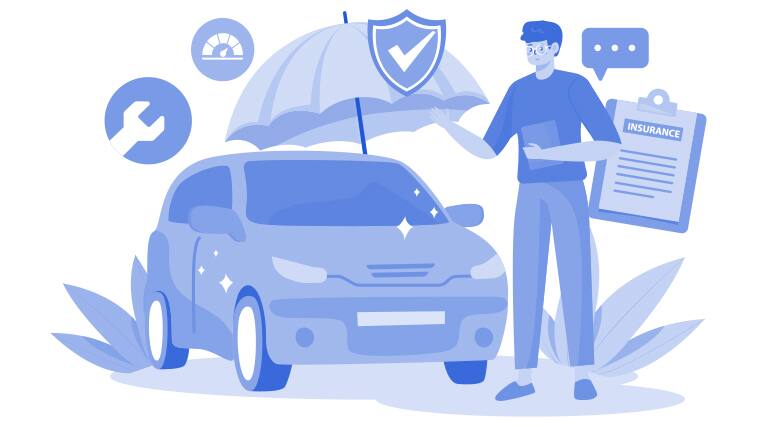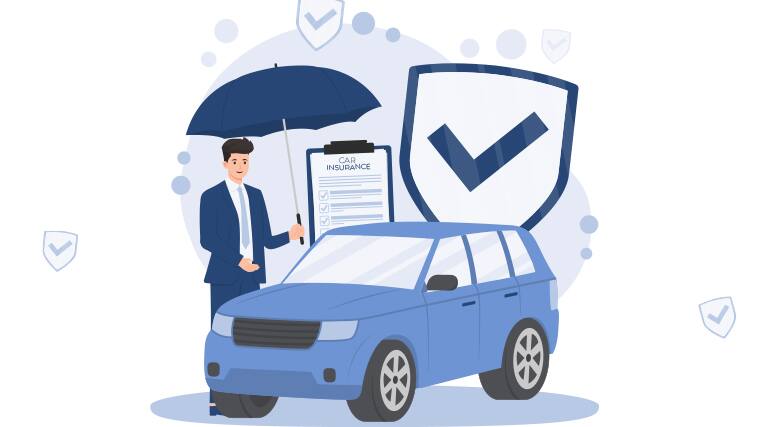-
Renew policy in 2 minutes*
-
21+ Insurers to choose
-
1.2Cr+ Vehicles Insured

-
Home

-
Motor Insurance

-
Car Insurance

-
Articles - CI

- EV Insurance vs Hybrid Car Insurance
EV Insurance vs Hybrid Car Insurance
Understanding the difference between EV insurance vs hybrid car insurance is as crucial as purchasing a car. When you shop for car insurance online for an eco-friendly ride, you may notice one thing: premiums for electric and hybrid cars aren't the same. While both EVs and hybrid cars use electricity to some extent, their insurance needs and costs differ significantly. Read on to explore the finer details of electric car insurance and insurance for hybrid cars.
Why Insurance Differs for EV and Hybrid Cars?
Hybrid and electric car insurance differ on various grounds, including the cost of purchasing the car and its components, add-on coverages, battery coverage, charging equipment, and more.
Electric vehicles run entirely on battery power. There is no combustion engine, fuel tank, or tailpipe, meaning fewer moving parts and potentially lower maintenance. Due to this, the battery and upfront costs become higher. And, EVs need specialised technicians for repair services.
Hybrid cars run on both an electric motor and an internal combustion engine. This combination offers the flexibility to allow the car to operate on both petrol and electricity. As compared to traditional vehicles, hybrid cars become costlier, and repairs are more difficult.
Such differences in the make and models create the basis of how insurers view risk and frame premiums of hybrid and electric car insurance.
Premium Pricing: What are Insurers Charging You for?
Insuring an EV is generally more expensive than covering a hybrid. It is because the cost to repair or replace parts, especially the battery, remains high.
A few reasons why electric car insurance premiums are steeper include:
Battery packs can cost ₹3 lakh to 20 lakh, depending on the model. If they are damaged in an accident, replacing them can turn out to be a costly affair.
Specialised technicians are needed for EV repair, even routine fixes, adding to labour charges.
EV claim payouts tend to be higher. Studies show EV insurance claims can be up to 30% more expensive than those for petrol or diesel cars.
Hybrids are more moderately priced when it comes to insurance. They still involve battery components, but these are smaller, and the industry has a better grip on hybrid repairs. Think of hybrids as the middle ground: more expensive than ICE vehicles, but generally more affordable to insure than EVs.
Repair Costs and Garage Networks: The Availability Gap
When a hybrid breaks down, most workshops can manage repairs. After all, it still has an engine similar to a conventional car. However, for electric cars, the network is still being built.
EV owners often have to:
- Pay a huge amount for highly trained technicians.
- Wait longer for spare parts.
- Rely solely on brand-authorized service centres.
This limited repair infrastructure is one reason insurers price EV coverage more cautiously. Until the EV servicing network grows, costs will likely remain elevated.
What Your Policy Should Cover?
Let's talk about comprehensive car insurance for these vehicles. It is more than what's legally required, but what's smart to include.
For EV Insurance
- Battery & Charging Equipment Protection: Many EV policies exclude battery degradation. You must opt for battery-specific coverage if available. Moreover, cables and wall-box chargers are more prone to theft and damage. So, you must check if your EV policy covers them.
- Roadside Assistance (RSA): RSA coverage is crucial when driving an electric vehicle because the threat of range anxiety and battery failures can occur at any moment.
For Hybrid Car Insurance
- Component-specific Protection: Hybrid cars use components, such as electronic controllers and battery control modules, that aren't present in traditional petrol cars. The basic insurance doesn't cover the damage to such elements. That's why such coverage is crucial for hybrid cars.
- Power Sources Cover: Hybrid cars run on both fuel and electricity. Your policy should clearly cover the engine and the electric drive system—leaving either out could cost you later.
Roadside Assistance: A Practical Must-Have
For most cars, roadside assistance in car insurance is a helpful add-on cover. However, for electric and hybrid cars, it's closer to essential. This is because:
EVs can face challenges like:
- On-the-spot charging if the battery dies.
- Towing to an authorised EV workshop.
- Help with software glitches or electrical faults.
Hybrids may not struggle with range, but when things go wrong, the electrical systems involved can be tricky. Whether it's a flat battery or something more complex, roadside assistance can make all the difference, especially if towing or repairs need special care.
Many insurers now offer roadside plans built with EVs in mind. But not all do. It's worth reading the details before you assume it's included.
Add-On Covers: Choose What Matters
Many EV owners assume that all tech-related features are automatically insured. But that is not true.
Here are some of the most crucial add-ons every EV owner must consider:
- Return-to-Invoice Cover: In case your vehicle is stolen or completely wrecked beyond repair, the return to invoice cover will be highly beneficial. This cover provides the original invoice value of your vehicle, not the depreciated amount.
- Key Replacement Cover: EVs have smart keys that cost thousands to replace. Key replacement cover is quite useful during such times.
- Consumables Cover: This cover is tailored for EVs with delicate electrical components, as even small parts can be costly.
On the other hand, the most relevant add-ons in for hybrid car insurance usually include:
- Engine and Gearbox Protection: Though hybrids rely partly on electric power, the engine and gearbox remain central. Protecting these components is essential.
- Zero Depreciation Cover: Given the cost of hybrid parts, the zero depreciation car insurance helps you recover the full value during repairs, without deductions for wear and tear.
Do Government Incentives Influence EV or Hybrid Vehicle Insurance?
The government offers subsidies to reduce the upfront and long-term ownership costs of hybrid and electric vehicles. However, these considerations do not factor into car insurance coverage.
Insurers may offer lower premiums for vehicles equipped with advanced driver-assistance systems (ADAS) or regenerative braking. And while not guaranteed, such benefits represent the safety profile of the vehicle and lower risk. Therefore, it is worth asking about when looking for EV or hybrid car insurance.
EVs or Hybrid Cars: Which One's Better Insured?
While EV insurance is comprehensive, increasingly tailored, it is costlier. It is best for urban drivers with access to charging stations and service networks.
On the other hand, car insurance for hybrid vehicles is more balanced. It comes with broader compatibility across garages and slightly more affordable premiums.
If you want zero emissions and fully electric mobility, prepare to spend more on protection. If you prefer the flexibility of fuel and battery, a hybrid paired with smart add-ons might be a better fit.
Last But Not Least
As cars become smarter and cleaner, insurance needs to keep pace. Whether it's EV insurance or hybrid car insurance, your policy should fit the way your car runs. Online options make it easy, but the right cover still needs thought. Batteries, tech, roadside help aren't extras, they're essentials. Because when your car runs differently, your insurance should follow suit.
FAQs
-
Q1. What happens if I modify my hybrid car with aftermarket parts?
Ans: Any modification, especially affecting safety or performance, must be declared. Otherwise, it may void parts of your insurance coverage. -
Q2. Are hybrid cars eligible for green discounts?
Ans: Yes, they may also get a green discount, but for a smaller amount. Usually, the discount depends on the car's safety features and engine efficiency. -
Q3. What if my EV runs out of charge mid-way? Is that covered in my insurance?
Ans: Not all RSA plans cover a battery charging facility. It will be provided only if you opt for roadside assistance that includes such EV-specific support. -
Q4. Are EV repairs always more expensive than hybrids?
Ans: Generally, yes. Due to battery size and specialised repair needs, EV repairs are more expensive. -
Q5. Can I transfer my no-claim bonus from my petrol car to an EV?
Ans: Yes, you can transfer your No Claim Bonus (NCB) from your petrol car to an EV car. The NCB is attached to the policyholder, not the vehicle type. Therefore, you can transfer it whether you switch vehicles or insurers. -
Q6. Do I need extra paperwork for EV or hybrid insurance?
Ans: There is no additional paperwork for EV or hybrid insurance. The same usual documents apply such as RC, ID proof, previous policy, etc. All you need to do is declare it is an EV or hybrid when proving the vehicle. -
Q7. Is zero depreciation cover a good option for hybrids?
Ans: Yes, zero depreciation cover is a good choice for hybrids and EVs in India, as there are expensive advanced parts and very expensive repairs. Zero dep ensures that when a part is replaced, the insurance company will not deduct depreciation on the component, resulting in much greater claim payout and especially low costs for the owner.
Find similar car insurance quotes by body type
































Explore More Under Car Insurance
- Motor Insurance
- Car Insurance
- Zero Dep Car Insurance
- Compare Car Insurance
- Car Insurance Calculator
- Third Party Insurance
- Comprehensive Car Insurance
- IDV Calculator
- Car Insurance Companies
- Own Damage Car Insurance
- Electric Car Insurance
- Pay As You Drive Insurance
- Renew Expired Car Insurance
- Used Car Insurance
- Car Insurance Status


Car Insurance Articles
- Recent Article
- Popular Articles

Why Do Car Insurance Prices Vary Across Insurers?
In India, car insurance prices vary from one insurer to another
Read more
A Comprehensive Guide to Renew Your Car Policy...
Imagine it is 11:50 PM and your car insurance expires at midnight
Read more
What is Lease Car Insurance?
Lease car insurance is a type of motor insurance policy designed
Read more
How Much Does Car Insurance Renewal Cost?
Car insurance renewal is a crucial step to ensure continuous
Read more
Does Electric Car Insurance Cover Battery...
In India, the shift to electric vehicles (EVs) is growing at a
Read more
How to Get Your Duplicate Car Insurance Policy...
In today's digital age, obtaining a duplicate car insurance policy online has never been easier. Whether you have
Read more
All About Car Fitness Certificate
A car fitness certificate (FC) ensures that a motor vehicle is fit to be driven on roads. As per the Indian Motor
Read more
How to Transfer Car Insurance Policy?
Buying a car, even second-hand, is a big decision, and often, people overlook the essential documentation involved
Read more
BH Number Plate: Bharat Series Registration...
The BH series number plates were proposed by the Ministry of Road Transport and Highways (MoRTH). If you relocate
Read more#Rs 2094/- per annum is the price for third-party motor insurance for private cars (non-commercial) of not more than 1000cc
*Savings are based on the comparison between the highest and the lowest premium for own damage cover (excluding add-on covers) provided by different insurance companies for the same vehicle with the same IDV and same NCB. Actual time for transaction may vary subject to additional data requirements and operational processes.
+Savings are based on the maximum discount on own damage premium as offered by our insurer partners.
^Lowest Price Guaranteed is based on certifications shared by insurers with us. Policybazaar will facilitate price matching subject to the terms and conditions of select insurers.
##Claim Assurance Program: Pick-up and drop facility available in 1400+ select network garages. On-ground workshop team available in select workshops. Repair warranty on parts at the sole discretion of insurance companies. Dedicated Claims Manager. 24x7 Claim Assistance.






















